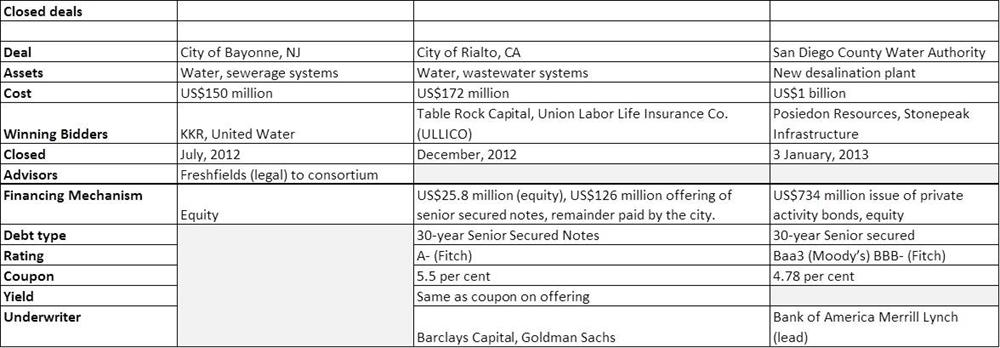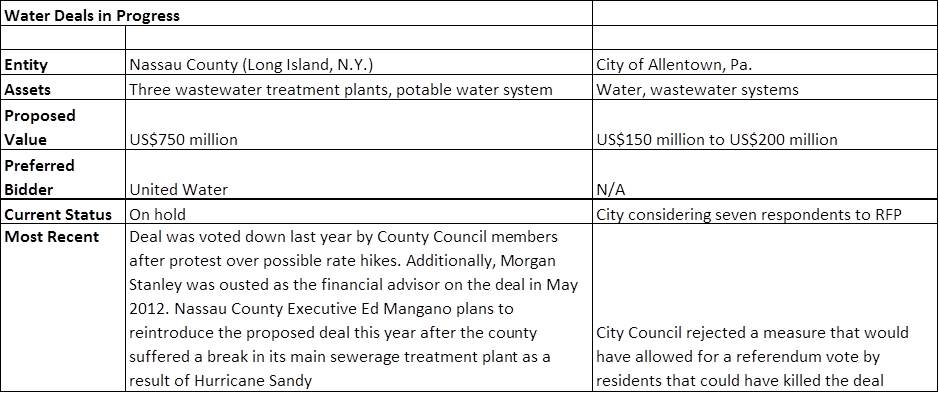News+: Carlsbad; a boost for US water
US P3 executives are hailing the deal to construct the US$1 billion desalination plant in Carlsbad, California, as a sign that the US market is finally beginning to turn the corner on completing P3s deals for water, wastewater and desalination.
In the past 12 months, three water deals closed in the US, including the Carlsbad deal – three more than had previously closed in 2011 and 2010 combined. Two more deals for private bidders to handle municipal water systems are still up in the air.
The past month saw two precedents set in the US water market. The first came at the end of December, when the Southern California city Rialto agreed to allow Union Labor Life Insurance Co. (ULLICO), private equity investor Table Rock Capital, and United Water to upgrade and operate the city's water and wastewater system for 30 years in exchange for US$172 million, US$25.8 million coming in the form of equity from ULLICO and Table Rock. The deal marked the first time that ULLICO, a labor-driven pension and life insurance management firm, invested directly in an infrastructure deal.
The San Diego County Water Authority’s (SDCWA) deal followed, to allow Poseidon Resources to construct and operate what will be the largest desalination plant in the US. The deal closed at the end of December, and the plant is expected to cost US$1 billion. The deal was in discussion for more than half a decade before it got done. Additionally, the city of Bayonne, NJ, got the deal flow started in July when it agreed to lease its water and wastewater systems to a consortium comprised of United Water and private equity firm KKR. The lease was in exchange for an upfront payment of US$150 million.
P3 deal makers said that the deals are very important for the US market because they showed that municipalities can engage private bidders to operate their water systems while still appeasing opponents who fiercely oppose allowing a resource as precious as water to fall under the control of the private sector. Those opponents include grass roots groups who believe that P3s for water systems will hike local water rates to unreasonable levels for citizens, and unions, who said that public utility workers will be pushed out of their jobs by the private sector.
Deal makers also said that the three completed deals could encourage further water deals, including two that are still in limbo.
The City of Allentown, Pennsylvania, is seeking to lease its water and wastewater systems to a private operator in exchange for US$150 million to US$200 million in a move to balance its Police and Fire pension plan. Early this month, the Allentown City Council rejected a call from citizens to hold a referendum vote to decide whether the city’s water systems, or any other city asset worth US$10 million or more, should be leased.
“We certainly hope these deals will encourage other municipalities to explore whether a P3 is appropriate for them,” said Richard Norment, executive director of the National Council on Public Private Partnerships (NCPPP). “These deals showed that rates can be capped. That’s extremely important because the biggest obstacle we’ve seen is fear from residents that water rates are going to be jacked up. These deals also show that P3s can be labor-friendly, as well as profitable for municipalities in the long run.”
Carlos Riva, CEO Poseidon, which recently moved its headquarters to Carlsbad from Stamford, Connecticut, predicted that the deal for the seawater desalination plant will encourage drought-ridden municipalities along the coast of Southern California to look to the private sector to construct desalination plants.
“The plant will be a key component of San Diego County water supplies and pave the way for future desalination projects in California and beyond,” said Riva. “This deal shows that everyone, including residents, can benefit from desalination plants. Municipalities generally don’t have expertise on hand to construct and operate desalination plants as efficiently and cost-effectively as the private sector. We think this deal will lead to further deals in this region and in other places.”
One of the municipalities that could learn from the Carlsbad deal is Monterey Bay, which delayed a deal indefinitely with California American (Cal Am) Water in August over issues pertaining to environmental reviews and water ownership rights. Under the deal, Cal Am was to construct and operate a desalination plant for US$400 million.
“Opposition to the Monterey deal was over an archaic ordinance saying that private companies cannot claim ownership over natural resources such as water,” said one individual close to the deal. “We hope to get that deal back on track at some point. We are examining how the deal in Carlsbad worked and perhaps can take some things from that.”
Both local governments and the US Congress could also learn from these deals. In Nassau County, Long Island, County Executive Ed Mangano is still hoping to get a deal done to lease the county’s water and wastewater systems to United Water for US$750 million. While the plan was rejected last year by the county’s Council members, Mangano said he hopes interest in the deal will be rekindled after Hurricane Sandy. The hurricane, the worst storm to ever hit the New York, New Jersey and Connecticut area, damaged the County’s main wastewater treatment plan in late October, spilling raw sewerage on to the streets.
State Governor Andrew Cuomo, in his 2 January State of the State address, said “To prevent a repeat of this scenario in the short-term, the existing wastewater treatment plants need to be repaired and mitigated to withstand higher flood levels.”
Mangano, in an interview with local press, said that he hopes “opponents of the (concession) plan took note of that. A private operator can fix our wastewater systems so that they can withstand a storm and operate it at efficient levels.”
One banker who was involved in selling US$126 million in 30-year senior private placement notes to help fund the Rialto deal, said that the deal was well received. The notes, which were rated A- by Fitch, carry a 5.5 per cent coupon and had a spread of 90 bps over comparable municipal bonds.
“Financing really isn’t the problem,” said the banker. “The issue was well received by institutional investors, who see a deal for a private water utility as carrying a generally lower risk level than, say, a deal for a highway where traffic volume can be unpredictable.”
One P3 attorney said that the three deals also could encourage members of the US Congress to pass the Water Protection and Reinvestment Act of 2012, which was still being debated towards the end of 2012. Many believe that the bill, which was introduced on 1 August, could be the pre-cursor to the Water Infrastructure Finance Innovations Authority (WIFIA), a proposed credit assistance program that would be similar to the Transportation Innovation and Finance Act (TIFIA) in that it would provide low-cost loans to states and municipalities to help fund the repair or replacement of existing water filtration and wastewater treatment facilities, as well as construct new ones.
“This country is facing a trillion dollar need to repair and upgrade water systems,” said the attorney. “We have a credit assistance program for highways, one would think that the same should be done for something as precious as water. They are going to be debating it this year, so one can hope that they can look at these deals as a yardstick for water privatisation.”
Request a Demo
Interested in IJGlobal? Request a demo to discuss a trial with a member of our team. Talk to the team to explore the value of our asset and transaction databases, our market-leading news, league tables and much more.

